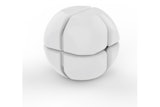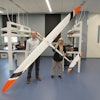The accomplishments of Microlution Inc. may not seem momentous at first glance. Take a closer look, however, and you'll see some extraordinary achievements from the Irving Park, IL manufacturer of integrated micromanufacturing solutions.
The equipment Microlution builds can create machined components of an exceptionally small size at extremely high levels of precision. Tiny parts are cut, milled, drilled, and turned on equipment that achieves a positional accuracy of =/-0.00004 in. (1 micron). Precisely controlled high speed spindles of 50,000+ rpm offer high volume production of intricate micro components for end users in the automotive, medical, aerospace, and consumer products industries.
Near-microscopic output isn't the only size advantage the company offers. Today's manufacturers are increasingly concerned over the scarcity of space on the production floor. Microlution responds with machines that pack an abundance of high-precision capability into a footprint as small as 2 ft wide, and a height of less than 5 ft.
When facing the task of achieving performance and size outcomes like these, ordinary automation solutions won't measure up. Company founders Anthony Honegger and Andy Phillip have had to search for components that deliver exceptionally precise and highly consistent movement, with a form factor that fits within a fraction of the space occupied by standard industry products. Development of rotary tables has been a particular challenge—one that Microlution solved with the help of a direct drive servomotor from Yaskawa.
Creating a Solution
"The solution we need doesn't exist from existing CNC rotary table builders," Honegger said. "Gear-driven solutions are fairly compact, but they don't offer the performance we need. There is also the issue of backlash with mechanical tables. Direct drive servo tables have the precision and the speed, but they are far too large. Some of them are as big as our entire machine."
After a thorough investigation, the Microlution team decided to design and build a rotary table of their own. Success demanded a direct drive servomotor that would fit in the available space in a Microlution machine, yet provide the torque required to rotate parts for a high-throughput machining process. An extensive search uncovered the Yaskawa SGMCV-04, a direct drive servo with a height of only 53 mm (2 in.) and a diameter of 135 mm (5.3 in.). Even though the size is a fraction of the footprint required for comparable direct drive servos, the SGMCV-04 has a torque output of 4 newton meters and a power output of 126 W. This level of performance proved to be ample for Microlution's fine cutting applications.
The direct drive motor's rotor couples directly to the chuck, eliminating gears and other mechanical transmissions and yielding a big improvement in accuracy and responsiveness. Eliminating mechanical compliance enables accurate and immediate response to position, velocity, and acceleration demands.
"An improvement of fractions of a second could give you a 10% increase in tact time," Honegger said. "At these rates, the benefits of direct drive technology become obvious pretty quickly." He also noted that a direct drive rotor table removes the mechanical backlash that leads to poor positioning of the part being machined. "When you're machining parts that are smaller than a fingernail, even a small lack of compliance can be a big issue," he added.
Protection from Harmful Elements
Protection was a key consideration in the finished rotary table design. The table's mechanism needed to be well protected from chips, dust, and cutting fluids to function reliably. The engineers at Microlutions chose to encase the Yaskawa servo in a sealed enclosure, with a liquid-cooled bottom plate to maintain the proper operating temperature.
"In our applications, temperature control is critical," noted Honegger. "With precision like this, a degree of temperature variation here or there could ruin our accuracy."
The native precision of the Yaskawa direct drive servo was further reinforced by augmenting the servo's existing bearing with a cross roller bearing at the top of the enclosure, adding rigidity and minimizing the possibility of off-axis motion during the indexing process. The Microlution engineering team also chose to implement linear servos to control some of the machine's other axes. By moving from mechanical transmission components like ball screws, belt drives, and mechanical gearing toward a completely servo controlled mechanism, a Microlution machine eliminates the mechanical compliance issues that diminish system speed and accuracy.
Unexpected Benefits
As a bonus, the Yaskawa direct drive meets Microlution's need to comply with the safety standards of customers worldwide. The Safe Limited Speed function built into the Yaskawa servo's amplifier helps the machines meet CE safety standards for delivery into the European Union.
"Having both the STO to turn the unit off and the safety limited speed was a big advantage for us," Honegger said. "Having that capability built into the amp meant we didn't need to develop a solution on our own. We were CE compliant right out of the box, which saved us a lot of time."
The new rotary table design is now a standard part of Microlution's high volume machines. It also holds the potential to be a successful retrofit for existing Microlution products now in place.
"The time savings is significant. Customers can probably gain a big improvement in speed and a 10% improvement in throughput," said Honegger. "At another company where we have four machines, we've estimated that a retrofit could increase throughput by 20%."
With improvements like these, it's no wonder that Honegger and his team have considered selling rotary tables as a separate product.
"It's tempting," he stated, "but frankly, we've been growing so fast to meet the demand for our machines that I don't foresee looking at any new market opportunities for quite some time to come."




















